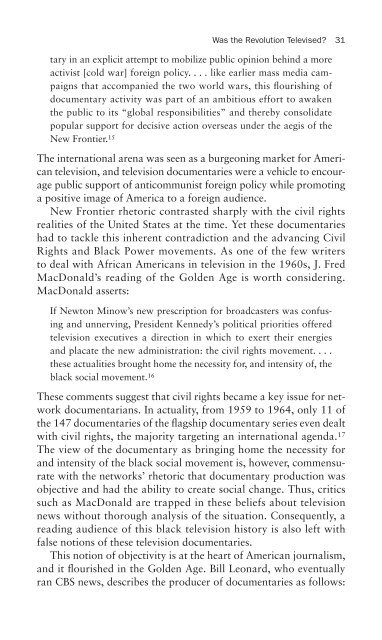Revolution Televised.pdf
Revolution Televised.pdf
Revolution Televised.pdf
Create successful ePaper yourself
Turn your PDF publications into a flip-book with our unique Google optimized e-Paper software.
Was the <strong>Revolution</strong> <strong>Televised</strong>? 31<br />
tary in an explicit attempt to mobilize public opinion behind a more<br />
activist [cold war] foreign policy. . . . like earlier mass media campaigns<br />
that accompanied the two world wars, this flourishing of<br />
documentary activity was part of an ambitious effort to awaken<br />
the public to its “global responsibilities” and thereby consolidate<br />
popular support for decisive action overseas under the aegis of the<br />
New Frontier. 15<br />
The international arena was seen as a burgeoning market for American<br />
television, and television documentaries were a vehicle to encourage<br />
public support of anticommunist foreign policy while promoting<br />
a positive image of America to a foreign audience.<br />
New Frontier rhetoric contrasted sharply with the civil rights<br />
realities of the United States at the time. Yet these documentaries<br />
had to tackle this inherent contradiction and the advancing Civil<br />
Rights and Black Power movements. As one of the few writers<br />
to deal with African Americans in television in the 1960s, J. Fred<br />
MacDonald’s reading of the Golden Age is worth considering.<br />
MacDonald asserts:<br />
If Newton Minow’s new prescription for broadcasters was confusing<br />
and unnerving, President Kennedy’s political priorities offered<br />
television executives a direction in which to exert their energies<br />
and placate the new administration: the civil rights movement. . . .<br />
these actualities brought home the necessity for, and intensity of, the<br />
black social movement. 16<br />
These comments suggest that civil rights became a key issue for network<br />
documentarians. In actuality, from 1959 to 1964, only 11 of<br />
the 147 documentaries of the flagship documentary series even dealt<br />
with civil rights, the majority targeting an international agenda. 17<br />
The view of the documentary as bringing home the necessity for<br />
and intensity of the black social movement is, however, commensurate<br />
with the networks’ rhetoric that documentary production was<br />
objective and had the ability to create social change. Thus, critics<br />
such as MacDonald are trapped in these beliefs about television<br />
news without thorough analysis of the situation. Consequently, a<br />
reading audience of this black television history is also left with<br />
false notions of these television documentaries.<br />
This notion of objectivity is at the heart of American journalism,<br />
and it flourished in the Golden Age. Bill Leonard, who eventually<br />
ran CBS news, describes the producer of documentaries as follows:

















